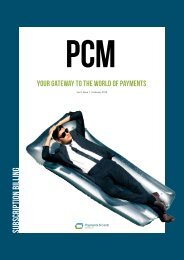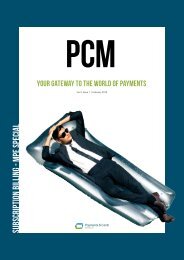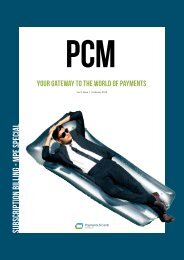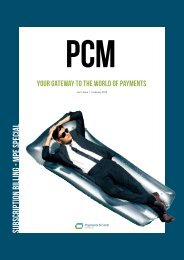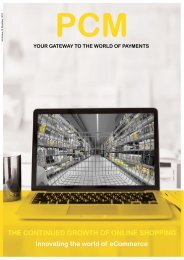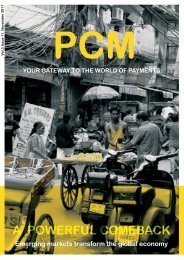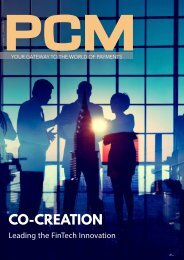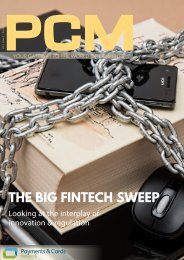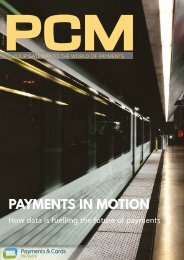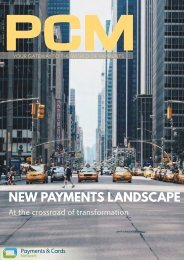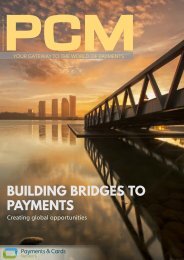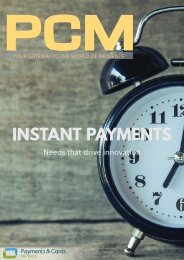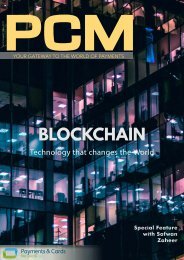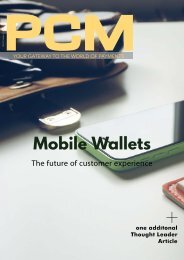PCM vol. 3 issue 2
The February issue of the Payments & Cards eMagazine "PCM" - In this issue we talk about all things Risk & Fraud in the Payments, FinTech and eCommerce space. Contributions from Risk Ident, Chargebacks911, 4Stop and Trulioo.
The February issue of the Payments & Cards eMagazine "PCM" - In this issue we talk about all things Risk & Fraud in the Payments, FinTech and eCommerce space. Contributions from Risk Ident, Chargebacks911, 4Stop and Trulioo.
Create successful ePaper yourself
Turn your PDF publications into a flip-book with our unique Google optimized e-Paper software.
Vol 3. Issue 2 | February 2017<br />
YOUR GATEWAY TO THE WORLD OF PAYMENTS<br />
Fraudsterland<br />
Are you doing enough?
MAXIMIZE<br />
YOUR DATA<br />
VALUE<br />
CONNECTING YOU WITH THE PEOPLE TO POWER YOUR BUSINESS EFFICIENCY<br />
CONTACT US NOW<br />
Having data dilemmas? Please contact: simon@digitalsource.io<br />
Digital Source | Herengracht 576 | 1017 CJ | Amsterdam | The Netherlands | +31 (0) 202 373 639
Contents<br />
Amir Abdin<br />
Editor-in-Chief<br />
amir@paymentsandcardsnetwork.com<br />
https://nl.linkedin.com/in/amir-abdin-21365683<br />
STORIES<br />
4<br />
Trust the Machines - Let them help you<br />
fight fraud<br />
8<br />
How to commit Fraud - Part 1<br />
10<br />
Risk & Fraud Trends to watch for in 2017<br />
Duc Dang<br />
Production Editor<br />
duc@paymentsandcardsnetwork.com<br />
https://nl.linkedin.com/in/ducdanghh<br />
13<br />
18<br />
21<br />
Chargeback & Friendly Fraud<br />
Start-up Spotlight: 4Stop<br />
Hot Jobs<br />
22<br />
Industry Events<br />
Layla Durani<br />
Editor<br />
layla@paymentsandcardsnetwork.com<br />
THANKS TO OUR PARTNERS<br />
https://nl.linkedin.com/in/layladurrani<br />
<strong>PCM</strong> is designed by Duc Dang, Payments & Cards Network. Art<br />
and photos © Payments & Cards Network, picjumbo.com and<br />
Shutterstock.com, excluding advertisments and company logos.<br />
<strong>PCM</strong> is property of Payments & Cards Network, Herengracht 576,<br />
2nd Fl., 1017 CJ, Amsterdam, The Netherlands. All material contained<br />
within <strong>PCM</strong> is the property of Payments & Cards Network. All other<br />
product and service names may be trademarks of their respective<br />
companies. ©2017 Payments & Cards Network. All rights reserved.<br />
Reproduction of any kind is strictly prohibited without express prior<br />
written consent of Payments & Cards Network.<br />
ADVERTISING INFORMATION<br />
For details, please contact amir@paymentsandcardsnetwork.com<br />
3
Thought Leaders Corner<br />
Trust the Machines –<br />
Let Them Help You Fight Fraud<br />
by Roberto Valerio<br />
Anyone who’s seen The Terminator, The Matrix or<br />
more recently Ex Machina could be forgiven for<br />
thinking that the machines will inevitably turn on<br />
us. The reality away from the big screens is that<br />
artificial intelligence and machine learning is all around us<br />
and is benefiting our lives in more ways than we had perhaps<br />
appreciated.<br />
For example, Spotify is using machine learning to evaluate<br />
user preferences and suggest increasingly accurate new<br />
music recommendations, while car manufacturers are using<br />
it to create the first road-safe driverless cars. Already we’re<br />
depending on the power of machine learning for important<br />
personal <strong>issue</strong>s too; medically it’s being used to research<br />
disabilities and prevent avoidable hospitalisations, while in<br />
an increasingly threatening global fraud landscape, it helps<br />
protect us every day.<br />
Fraud threats are e<strong>vol</strong>ving constantly as criminals devise<br />
more inventive ways of bringing down online businesses. Last<br />
year, Risk Ident conducted a survey which found that online<br />
merchants had a rather long cycle when it came to adjusting<br />
4
Thought Leaders Corner<br />
their fraud prevention rules: 42% change them once a quarter,<br />
26% once every six months and 22% only readjust them once<br />
every year. This is dangerous, as fraudsters don’t sit still or<br />
update their tactics every quarter or year; they e<strong>vol</strong>ve their<br />
methods constantly, probing for weaknesses to exploit.<br />
Fraud prevention should be able to intelligently e<strong>vol</strong>ve to meet<br />
these changeable threats as they arise. In the near future we<br />
can expect to face the following challenges:<br />
Data Breaches<br />
In 2016, Yahoo fell victim to one of the most devastating<br />
breaches we’ve ever seen, reportedly leaking data from more<br />
than 1 billion user accounts, while UK telecoms company<br />
TalkTalk was fined a record amount by the authorities for<br />
allegedly failing to apply “the most basic cyber security<br />
measures” for 150,000 customers. A recent Office for National<br />
Statistics (ONS) survey estimated that the UK saw 3.6 million<br />
cases of fraud and 2 million computer misuse offences last<br />
year, making fraud “now the most commonly experienced<br />
offence.”<br />
This trend will only continue in 2017, where hacking will target<br />
private user information, including names, email addresses,<br />
telephone numbers, dates of birth, passwords and security<br />
question answers. Collectively we need to identify such threats<br />
early and minimise any potential damage.<br />
Snooping on social media<br />
Social media leaves our personal information vulnerable to<br />
fraudsters who use Google, Facebook, LinkedIn and Twitter as<br />
research facilities. The number of identity theft victims rose by<br />
57% between 2015-2016, according to non-profit organisation<br />
Cifas, who attributes this sharp rise to information made<br />
public on social sites. It has never been so easy to piece<br />
together information on a specific person, and sometimes<br />
no technological expertise is needed: fraudsters simply take<br />
advantage of people sharing too many details publicly, which<br />
should be kept private. Spreading awareness about the dangers<br />
of over-sharing will help cut the levels of damage fraudsters<br />
can cause.<br />
Account takeovers<br />
Every internet user has a lot of different online accounts.<br />
Instead of using unique passwords for every service – as<br />
experts suggest – most of us take the easier route and re-use a<br />
few favourites. But the fraudsters are aware of this weakness<br />
and are using it to their advantage. For example: shopping on<br />
the black market in the dark corners of the web, fraudsters can<br />
buy usernames and passwords and use them to try multiple<br />
other accounts online. We expect fraudsters to attempt even<br />
more in 2017.<br />
Booming bots attacks<br />
Disruptive smart software can generate spam, vandalise<br />
information on Wikipedia or try to influence opinions on social<br />
media. But bots are helping fraudsters as well. For example,<br />
when it comes to ticketing, bots are often able to order tickets<br />
Roberto Valerio<br />
CEO - Risk Ident GmbH<br />
Roberto Valerio is founder and CEO of RISK IDENT,<br />
a software development company specialising in<br />
fraud prevention and credit risk evaluation based<br />
on machine learning. He plays an active part<br />
within the fraud prevention community and he is<br />
a member of the European Advisory Board at the<br />
Merchant Risk Council. Beforehand he founded<br />
and worked within different management roles for<br />
software startups. He has a background in business<br />
administration.<br />
faster than real customers. The number of bots, and the level<br />
of their intelligence, will continue to increase in 2017, so expect<br />
the ticket black market, among others, to grow.<br />
Mobile Shopping<br />
The number of Europeans regularly using a mobile device for<br />
payments tripled from 2015 to 2016 (18% to 54%), according<br />
to Visa. Through a mixture of contactless, online and in-app<br />
payments, more of us are using mobile devices to complete<br />
transactions. However, fraudsters are using these new<br />
channels to exploit weaknesses. Often they will use multiple<br />
portable devices, alongside other masking techniques, in<br />
attempts to avoid triggering fraud alerts.<br />
Man and machine – a perfect team<br />
Using data science and machine learning, online merchants can<br />
create intelligent algorithms capable of detecting connections<br />
between individual transactions as well as unidentified fraud<br />
scenarios.<br />
5
Thought Leaders Corner<br />
While fraudsters seek to conceal their locations, mask their<br />
identities and trade payment card details or other personal<br />
information online, machine learning technology is able to<br />
find patterns, calculate risks and halt their activities – in<br />
real-time.<br />
Fraud managers are indispensable in this process. A human<br />
being with years of experience fighting fraud can never be<br />
replaced by a machine, but a combination of the two entities<br />
can produce fantastically accurate results. Domain experts<br />
know their fraud problems best but they need scalable software<br />
to help. By constantly feeding their knowledge on the context<br />
and causes of fraud into the machine, the system can e<strong>vol</strong>ve<br />
continually. Fraud managers can therefore scale their fraud<br />
protection system by teaching the machines to help monitor<br />
for illegal activity.<br />
This new strategy is now being taken up by merchants across<br />
the world and will become ever more critical in helping<br />
turn the tide of online fraud. Once the machines have been<br />
intelligently taught, they can become a scalable, accurate and<br />
consistent weapon to help us terminate fraud threats before<br />
they unleash chaos across the online world. The machines are<br />
not turning on us – they can make our lives better and help<br />
merchants take on fraudsters.<br />
Risk Ident<br />
Risk Ident is a leading software company that offers efficient<br />
anti-fraud solutions to companies within the ecommerce,<br />
telecommunication and financial sectors - empowering<br />
fraud managers with intelligence and self-learning machine<br />
technology to provide stronger fraud prevention. The<br />
company is home to a veteran team of data scientists and<br />
software engineers with long-term experience in data<br />
analytics and machine learning. Risk Idents products are<br />
specifically tailored to comply with European data privacy<br />
regulations. www.riskident.com/en<br />
6
Thought Leaders Corner<br />
How to commit fraud - Part 1<br />
by Edoardo Fiorentini<br />
Of course, I’m not going to tell you how exactly to look<br />
for tools and tips on how to commit (or prevent)<br />
fraud. But trust me, there are tons of websites and<br />
material for both those who want to commit and<br />
prevent fraud. In both the case of wanting to perpetrate or<br />
prevent fraud, the initial questions are the same:<br />
• Where can I get more profit from circumventing a system?<br />
• What products would I steal and how?<br />
• Do I pay with credit card or do you offer other<br />
(questionable) payment methods?<br />
And:<br />
• Where can I get more profit from circumventing a system?<br />
• What products would I steal and how?<br />
• How do I bypass the payment part?<br />
Bottom line, the question remains for both those who wish<br />
to prevent and commit fraud: Have you googled it?<br />
So, let’s begin with the point of view of a fraudulent guy. Let’s<br />
call him Mark. Mark has been laid off his IT position after<br />
some budget cuts. He knows his way around Windows and<br />
network configuration. Mark is also savvy around forums and<br />
communities. The anonymity he gets behind his keyboard<br />
8
Thought Leaders Corner<br />
feeds his arrogance and the feeling that the world owes him<br />
everything.<br />
How to commit fraud? Identify your prey. Who is the victim<br />
of your plan? Perhaps an old retired man that you plan to use<br />
as a mule? Or are you thinking about stealing the identity of<br />
someone in a coma and requesting loans in his name?<br />
I hope you see where I’m going here. Fraud seems a harmless<br />
act when you don’t consider the victim. But you have to. He<br />
is the one you want to steal from, right? So… Sun Tzu’s quote<br />
“Know your enemy” should ring a bell.<br />
“But I’ll steal from big corporations and that’s like not stealing<br />
because they make millions”.<br />
It’s not for me to judge if these corporations truly deserve<br />
their millions, because they actually produce richness. But<br />
anyhow, contributing to their losses may impactbudget cuts<br />
that will hurt their lower level employees and could lead to<br />
unemployment.<br />
However, like everything in life, (what does this mean?)<br />
All ecommerce companies deal in some way with fighting<br />
fraud. Either directly, by employing bright workers and<br />
developing brilliant tools, or indirectly as a cost when<br />
redirecting the service to an external provider. Either way,<br />
anyone working in this sector, will tell you that minimal losses<br />
are not only acceptable, but actually put the whole department<br />
cost in question. Some have even admitted, after a few, that<br />
they might not mind a bit of fraud, to justify the budget needs.<br />
So, since you want to avoid being seen and drawing attention<br />
to your fraud, you want to stay between certain parameters<br />
of “acceptable risk”. If you plan to steal a watch, you may be<br />
more successful getting a plastic one rather than a gold one.<br />
Of course the reward is bigger on the higher value item, but<br />
you don’t want to be a single hit guy remember? You want to<br />
dedicate to commit fraud in a professional manner. Guess<br />
what, you can’t do it properly from behind bars, can’t you?<br />
On the prevention side of the coin, life goes on in quite a similar<br />
pattern. You can’t reject orders based on small suspicions.<br />
Nor can you afford the cost of manually reviewing all orders<br />
(Imagine life if this was the magical formula to prevent fraud!).<br />
You need to find the balance to reach an acceptable risk rate<br />
compared to the resources employed in the operation. Please,<br />
read the above paragraph addressed to our fraudster. He is<br />
not so stupid as to go for the most expensive item you have<br />
in the store. He knows you will have some value triggered<br />
rules in your system and he will circumnavigate them. And<br />
believe me, the fraudster who doesn’t know your values will<br />
test your system with a few orders to understand your velocity<br />
rules and your value rules. Once he understands the schema,<br />
there will be a series of chargebacks that you will categorize<br />
as “unavoidable at that time”. However, since you will have<br />
questions about your operation, you will still want to keep that<br />
healthy balance between acceptance rate and chargeback rate.<br />
I was once hit by a fraudster we called the “Indonesian guy”.<br />
We received solely fraudulent looking orders—he wasn’t even<br />
trying to get the orders through.. And I couldn’t t sleep at night<br />
thinking that this guy was testing my system, my rules etc.<br />
Luckily for me, he was doing referral fraud and thanks to<br />
the connections I had at Paypal, I was able to push this guy<br />
somewhere else to do something similar—but elsewhere.<br />
That’s what we do in risk prevention, don’t we? We push<br />
Edoardo Fiorentini<br />
Risk Management Expert<br />
Edoardo “Edo” Fiorentini has worked as risk manager<br />
in numerous e-commerce businesses. He also is<br />
co-chair of the Fraud Committee and European<br />
Advisory Board of directors of the MRC (Merchant<br />
Risk Council). This gentleman describes himself<br />
to be a passionate risk professional with years of<br />
experience with CNP transactions. Edo has been<br />
fully dedicated into achieving and maintaining the<br />
difficult balance between fraud management and<br />
conversions in e-commerce.<br />
fraudsters somewhere else. Let them steal money from<br />
someone else. Still, a good person would alert the neighbours<br />
if there is a thief roaming around the neighbourhood. But not<br />
so in ecommerce, let’s just push them away to someone who<br />
doesn’t have sophisticated fraud prevention systems.<br />
And you think that being too good at preventing fraud is cool?<br />
It may be true that if you kill fraud, your budget will decrease.<br />
Ask a fireman. Once there are no more fires and there is no<br />
immediate threat , how easy will it be to receive additional<br />
budget? No, I’m not suggesting you to let a big fraudster hit<br />
your company to be able to receive a bigger budget to “fix” the<br />
problem. That will get you fired in the process. In that case,,<br />
your former company will now spend more budget to “fix” the<br />
problem, without you.<br />
Stay tuned for more!<br />
9
Thought Leaders Corner<br />
by Stephen Ufford<br />
Risk & Fraud Trends to Watch<br />
for in 2017<br />
Hacking email accounts to influence the US election.<br />
Millions of passwords stolen in one fell swoop. The<br />
use of stolen card data in card-not-present (CNP)<br />
situations surging 40% in one year. You don’t need to<br />
look far to see incidents of risk or fraud - and the problem<br />
seems to be getting worse.<br />
What can you do as a payments industry expert to watch out<br />
for new threats and protect your business from fraudsters and<br />
other attacks? Of course, the <strong>issue</strong> is multi-pronged, as there<br />
are numerous types of threats to guard against and, numerous<br />
techniques to assess. Let’s take a look at some of the biggest<br />
challenges in 2017 and possible solutions.<br />
Increasing Globalization<br />
One of the biggest benefits of e-Commerce is the ability to<br />
sell to almost anywhere and anytime, regardless of physical<br />
location. Thus, selling online requires effectively dealing with<br />
the vagrancies of international payments, different payment<br />
providers, modes of payment, verification method, common<br />
practices, and regulations. One example, requiring AVS on<br />
order validation is an unnecessary step for global commerce,<br />
yet 70% of retailers rely on it.<br />
It’s not enough to identify a market opportunity, set up and<br />
sell; situations change and your standards must be kept up to<br />
date. In Europe, the new General Data Protection Regulation<br />
(GDPR) is coming into effect in 2018 and requires reporting<br />
of any data breach within 72 hours, among numerous other<br />
requirements. Businesses need to start preparing now to<br />
ensure that they are in compliance.<br />
Another global threat that is especially concerning is cyberwarfare.<br />
The escalation from information gathering to cyberattacks<br />
portends an era where businesses are at threat by<br />
sophisticated, nation-state backed groups. The more critical a<br />
company is, the more likely it will be a target. Businesses need<br />
to report breaches as soon as possible and work with industry<br />
groups to ensure that they are using best practices.<br />
Increasing Sophistication<br />
Unfortunately, as the cyber-attack groups demonstrate, the<br />
criminals are getting more sophisticated. In many cases<br />
you’re not up against just a lone hacker, but rather, organized<br />
criminal groups that have deep resources at their disposal.<br />
To counter this, you need to implement more sophisticated<br />
fraud prevention techniques. Analyze more data for patterns<br />
that indicate fraud; a surge in particular browser types or<br />
particular types of purchases or other discrepancies warrant<br />
further attention. Cross-checking purchases to previous<br />
orders can point out problematic customers, or on the<br />
contrary, indicate a good client. Implement best practices,<br />
such as tokenization, encryption, identity verification and<br />
risk engines to better detect and prevent fraud.<br />
10
Thought Leaders Corner<br />
Increasing Mobile<br />
It seems no account of any payment industry trend can be<br />
without a mention of mobile. Mobile commerce is exploding,<br />
accounting for 61% of total e-Commerce traffic. While many<br />
are using mobile for discovery only and use a desktop for<br />
actual orders, mobile revenue is also growing. While a<br />
perception of risk still persists, mobile purchases are actually<br />
45% safer than desktop orders, according to Riskified data.<br />
The largest risk in mobile is losing the sale. Abandoned carts<br />
are a major <strong>issue</strong>; for maximum results, simplify complicated<br />
ordering processes, enable easy mobile payment options such<br />
as; Google Wallet, Apple Pay, and PayPal; and take advantage<br />
of unique mobile data (carrier info, GPS, and social media).<br />
Increasing Intelligence<br />
The world is getting faster and mere mortals have a tough<br />
time keeping up. Lucky for us, there is a whole new range<br />
of tools that will increase our capabilities, simplify our<br />
processes and make us look like heroes to our bosses.<br />
However, businesses taking no action and opting to take a<br />
‘wait and see’ approach risk falling behind in technology,<br />
new processes and capabilities. The speed of innovation will<br />
not be kind to dawdlers, as the gaps created now will be hard<br />
to overcome.<br />
Machine learning and other Artificial Intelligence (AI)<br />
techniques offer the potential to analyze more transactions,<br />
on a deeper level than a team of fraud experts. This is not to<br />
say that AI can replace your fraud team, but rather, it allows<br />
them to focus on more difficult cases where creativity and<br />
ingenuity come into play.<br />
Working together, fraud prevention teams and smart<br />
technology offers a way to limit risk while still taking<br />
advantage of growth opportunities. As the potential for fraud<br />
and risks grows, smart payment experts need to up their<br />
technology game; the tools are there, the question is will you<br />
use them?<br />
Stephen Ufford<br />
CEO & Founder, Trulioo<br />
Stephen has founded several consumer data focused<br />
startups over the last decade while working in the role<br />
as CEO. In 2011, the identity veteran started his most<br />
recent startup, Trulioo, a global identity verification<br />
company focused on building a framework of trust<br />
online, implementing best privacy practices, and<br />
advancing financial inclusion.<br />
Trulioo<br />
Trulioo is a global ID verification company that provides advanced analytics from traditional<br />
and cyber data sources to instantly verify identities online. Trulioo’s bank-grade identity<br />
verification API enables businesses to perform frictionless identity verification for 4 billion<br />
people in over 60 countries via more than 200 data sources - the widest coverage in the<br />
market. GlobalGateway helps businesses comply with Anti-Money Laundering (AML) and Know<br />
Your Customer (KYC) identity verification needs, and provides a reliable and trustworthy way<br />
for businesses to evaluate new and existing users through one, single portal or API.<br />
11
LOOKING FOR A JOB?<br />
THERE’S NO BETTER WAY TO START YOUR CAREER IN PAYMENTS<br />
Sign-up for free now<br />
www.payment.jobs<br />
www.payment.jobs
expert interview<br />
Chargeback &<br />
Friendly Fraud<br />
Monica Eaton-Cardone is the COO of<br />
Chargebacks911. She is an internationallyrenowned<br />
thought leader and expert on payment<br />
processing, eCommerce sustainability, and risk<br />
relatively. She was recently named Executive<br />
of the Year and Innovator of the Year through<br />
the American Business Awards. Connect with<br />
Monica on LinkedIn or Twitter.<br />
For many merchants, chargebacks<br />
are a hidden threat that slowly<br />
siphon revenue until loss is an<br />
unmitigated liability. But what are<br />
chargebacks? How can merchants gauge<br />
their risk? And what can be done to stop<br />
the needless revenue loss?<br />
<strong>PCM</strong>: What are chargebacks and who<br />
is afflicted by them?<br />
Monica: A chargeback is a forced credit<br />
or debit card refund. A cardholder’s bank<br />
will forcibly remove funds from the<br />
merchant’s account and return them to<br />
the cardholder.<br />
Valid chargebacks can be requested in<br />
cases of fraud. There are two types of<br />
fraud that warrant a chargeback.<br />
1. Criminal fraud: A criminal made an<br />
unauthorised transaction without<br />
the cardholder’s consent.<br />
2. Merchant fraud: The merchant didn’t<br />
fulfil obligations. Examples might<br />
include: failing to ship merchandise,<br />
not acknowledging customer<br />
queries, refusing to provide refunds<br />
for qualified transactions, etc.<br />
Other situations might prompt an<br />
illegitimate chargeback, known in the<br />
eCommerce environment as friendly<br />
fraud. Friendly fraud chargebacks are<br />
usually divided into two categories:<br />
1. Accidental friendly fraud: The<br />
cardholder didn’t realise the<br />
chargeback wasn’t appropriate<br />
or was predicated on illegitimate<br />
reasoning. For example, the<br />
cardholder didn’t recognise the<br />
business’s name on the bank<br />
statement and assumed it was an<br />
unauthorised purchase.<br />
2. Intentional friendly fraud: The<br />
cardholder sets out to get something<br />
for free (cyber shoplifting) or opts<br />
for the most convenient resolution.<br />
For example, the cardholder might<br />
suffer from buyer’s remorse and<br />
claim the product wasn’t delivered—<br />
when it actually was.<br />
It is important to note that valid<br />
chargebacks are a powerful and<br />
necessary consumer protection<br />
mechanism, however, the rise of friendly<br />
fraud shows consumers have learned<br />
to exploit loopholes in the archaic<br />
chargeback process. Devised in the<br />
pre-internet era, the chargeback process<br />
is not designed to provide an equitable<br />
resolution for eCommerce disputes.<br />
However, because of friendly fraud,<br />
merchants are suffering unjustified<br />
revenue loss, and consumers are<br />
experiencing consequences of their<br />
own doing. Friendly fraud causes<br />
merchants to lose the merchandise and<br />
revenue, experience increased fines and<br />
penalties, and ultimately, jeopardise<br />
payment processing capabilities.<br />
Meanwhile, consumers will start paying<br />
more for the same goods and services<br />
because merchants must compensate<br />
for the additional losses and costs. And,<br />
if the bank suspects the cardholder is<br />
soliciting illegitimate chargebacks, the<br />
bank account could be closed and the<br />
credit score damaged.<br />
Merchants loose roughly €37 billion<br />
to friendly fraud each year, and rates<br />
increase between 41-55% annually,<br />
depending on the industry and<br />
geographic location.<br />
<strong>PCM</strong>: Why does friendly fraud continue<br />
unchecked?<br />
Monica: There are several reasons why<br />
13
expert interview<br />
the friendly fraud epidemic continues.<br />
And, until these <strong>issue</strong>s are resolved,<br />
merchants won’t see a reprieve.<br />
An Outdated & Non-Compliant Process<br />
The chargeback process was created in<br />
a pre-internet era and has experienced<br />
very few adaptations to accommodate<br />
modern transactions. Changes that have<br />
been made to card scheme regulations<br />
(Visa, Mastercard, etc.) take advantage<br />
of technologies to streamline processes,<br />
not necessarily to identify and rectify<br />
shortcomings.<br />
In conjunction with the static regulations<br />
that haven’t e<strong>vol</strong>ved in tandem<br />
with emerging eCommerce fraud<br />
opportunities, the chargeback process<br />
lacks consistently-applied standards.<br />
The lack of transparency regarding how<br />
and if regulations are enforced makes<br />
it difficult to achieve effective and<br />
sustainable remediation.<br />
Learned Consumer Behaviour<br />
Experts claim we live in the “Age of the<br />
Consumer,” with instant gratification<br />
being the dominate characteristic.<br />
Consumers expect prompt results<br />
in everything they do, including<br />
transaction dispute resolution.<br />
A survey of customers who had filed an<br />
illegitimate chargeback revealed 81% had<br />
acted out of convenience—it was easier to<br />
call the bank than the merchant.<br />
Because friendly fraud is increasing<br />
at such a rapid pace, merchants and<br />
<strong>issue</strong>rs are ill equipped to handle the<br />
influx. Issuing banks don’t execute the<br />
needed due diligence to detect friendly<br />
fraud, and merchants don’t challenge<br />
illegitimate transaction disputes. As a<br />
result, consumers perceive chargebacks<br />
as a no-hassle alternative, void of<br />
consequences.<br />
Management Challenges<br />
Card schemes have <strong>issue</strong>d “reason<br />
codes” to help banks explain why a<br />
given transaction has been disputed.<br />
However, friendly fraud can be disguised<br />
with virtually any reason code. This<br />
makes it challenging for merchants to<br />
differentiate between valid and invalid<br />
chargebacks.<br />
As a result, merchants lose a significant<br />
portion of revenue—as much as 87% of<br />
all chargebacks are illegitimate—that<br />
could be recovered if they were able to<br />
conclusively identify friendly fraud.<br />
And, the vicious cycle continues.<br />
Merchants don’t challenge friendly<br />
fraud, so consumers don’t perceive<br />
drawbacks to their faulty behaviour and<br />
<strong>issue</strong>rs aren’t compelled to comply with<br />
industry regulations.<br />
14
expert interview<br />
<strong>PCM</strong>: Is there anything<br />
that can be done about<br />
friendly fraud? Or is<br />
it just a cost of doing<br />
business?<br />
On the surface, it seems<br />
like there isn’t anything<br />
that can be done about<br />
friendly fraud, and many<br />
merchants do accept it as<br />
a cost of doing business.<br />
But at Chargebacks911,<br />
we’ve made an important<br />
discovery.<br />
All that’s needed to<br />
manage friendly fraud<br />
is an understanding of<br />
transaction disputes<br />
by source. Every single<br />
chargeback can be traced<br />
back to one of three things:<br />
criminal fraud, merchant<br />
error, or friendly fraud.<br />
If merchants are able to identify the<br />
source of a chargeback, they can create<br />
effective prevention and dispute tactics.<br />
Otherwise, merchants are simply<br />
treating symptoms if they are not solving<br />
problems at their source.<br />
Chargebacks911 has created a unique<br />
technology, Intelligent Source Detection,<br />
which identifies chargeback triggers.<br />
That technology, combined with our<br />
expert management strategies, helps<br />
merchants reduce criminal fraud,<br />
eliminate merchant error, and then fight<br />
everything that’s left—which is friendly<br />
fraud.<br />
The concept seems simple, and for<br />
those who take advantage of our<br />
technology and expertise, it is. But for<br />
those merchants who are determined<br />
to mitigate chargebacks on their own,<br />
it’s best to manage based on the card<br />
schemes’ reason codes to avoid disputing<br />
legitimate chargebacks and damaging<br />
client retention.<br />
And, since representment opportunities<br />
will be limited without ISD technology,<br />
it’s best for merchants to try preventing<br />
friendly fraud.<br />
• Use easy-to-recognise billing<br />
descriptors.<br />
• Provide exemplary customer service<br />
(answer the phone when it rings,<br />
reply to emails, respond on social<br />
media, etc.).<br />
• Consider a user-friendly return<br />
policy—the less restrictive, the<br />
better.<br />
• Use delivery confirmation, at least<br />
for big-ticket items.<br />
• Use additional identification<br />
verification methods, like texting<br />
an authorization code or verifying<br />
with social media.<br />
• Fully disclose the use of Dynamic<br />
Currency Conversion.<br />
• Request the card security code.<br />
• Promptly <strong>issue</strong> refunds for qualified<br />
purchases.<br />
<strong>PCM</strong>: Why don’t traditional fraud<br />
detection tools work for friendly<br />
fraud?<br />
Monica: Some fraud detection tools—<br />
such as card security codes, 3D Secure,<br />
and Address Verification Service—will<br />
help build a compelling case against<br />
friendly fraud, but won’t help prevent it.<br />
Fraud filters won’t help either. Fraud<br />
filters are based on machine learning:<br />
they analyse characteristics of confirmed<br />
criminal fraud to very successfully<br />
prevent future instances. However, since<br />
friendly fraud results from authorised<br />
transactions conducted by loyal<br />
customers, the defining characteristics<br />
of fraud won’t be applicable.<br />
Trying to use fraud filters to detect<br />
illegitimate chargeback potential will be<br />
a costly mistake. Tightening fraud filter<br />
rules will simply result in additional<br />
false positives, needlessly declining<br />
good sales. Also, it will damage customer<br />
loyalty and brand reputation.<br />
If you think friendly fraud has, or will,<br />
become a liability and would like help<br />
creating an effective mitigation plan,<br />
seek professional assistance. Any of the<br />
chargeback experts at my own company,<br />
Chargebacks911, would be happy to help.<br />
Get an expert opinion on what does and<br />
doesn’t work with your current strategy,<br />
as well as ideas on how to enhance your<br />
efforts. It is best to take a proactive<br />
stance, rather than function in reactive<br />
mode once chargeback rates escalate.<br />
15
<strong>PCM</strong>: How do you determine if<br />
chargeback rates are “dangerous?”<br />
When is it time to get help?<br />
Monica: Chargeback management is<br />
an essential task for any eCommerce<br />
merchant. While it might be tempting to<br />
disregard chargebacks as a nuisance or<br />
minor profit drain, they actually impact<br />
the business’s longevity.<br />
If the chargeback-to-transaction ratio<br />
exceeds 1%, payment processors are<br />
forced to take remedial action against<br />
merchants. In an effort to mitigate their<br />
own risk, processors will likely start<br />
penalising a merchant long before the<br />
1% threshold is breached.<br />
Once payment processing capabilities<br />
are lost, the business’s sustainability<br />
has forever been impacted. Obtaining<br />
new merchant agreements will be time<br />
consuming, expensive, and difficult.<br />
Therefore, it is advisable for merchants to<br />
take a proactive approach to chargeback<br />
mitigation before risk becomes an<br />
unchecked liability.<br />
Merchants should watch for the<br />
following warning signs, as these<br />
indicate immediate action is needed:<br />
• Chargeback-to-transaction ratio<br />
above 0.5% -- Card schemes will<br />
<strong>issue</strong> warnings once ratios hit<br />
0.75% and enter merchants into a<br />
monitoring program at 1%.<br />
• Chargeback value-to-transaction<br />
value ratio above 0.5% -- Some<br />
processors are only watching the<br />
chargeback value, not the count,<br />
because merchants are running<br />
many low-value transactions.<br />
• Number of chargebacks categorized<br />
as fraud increases by 20% or more<br />
in a 14-day period – Card schemes<br />
will penalise merchants for this<br />
and enrol them in monitoring<br />
programs.<br />
• Revenue holds are implemented –<br />
If acquirers sense risk is escalating,<br />
they’ll implement revenue holds as<br />
a form of insurance to protect their<br />
own assets.<br />
• Acquirer has requested a mitigation<br />
plan – Acquirers will need to<br />
determine if elevated risk levels are<br />
temporary and can be remediated<br />
or if they are permanent and<br />
uncontrollable.<br />
• Enrolment in a chargeback or fraud<br />
monitoring program – Merchants<br />
must lower chargeback and fraud<br />
rates—and keep them low—within<br />
a predetermined time period or<br />
processing rights will be revoked.<br />
While these general warning signs can<br />
help you gauge risk, a personal review<br />
of your business’s unique situation<br />
would be best. There might be other,<br />
hidden, indicators of trouble, as well<br />
as simple changes that would make a<br />
significant impact and greatly reduce<br />
risk. Again, I’d be happy to help—asking<br />
for assistance is the first step toward<br />
creating change.<br />
Chargebacks911<br />
Chargebacks911, a Global Risk<br />
Technologies company, provides<br />
comprehensive<br />
chargeback<br />
management services with guaranteed<br />
results. Dynamic, scalable solutions are<br />
customised for 26 different industries<br />
with the flexibility to accommodate<br />
any payment method or sales tactic.<br />
Chargebacks911’s 350 employees<br />
manage 200 million transactions<br />
monthly from locations in North<br />
America, Europe, and Asia.<br />
16
Spotlight<br />
You think you have what it takes to start a<br />
business in a super-hot market?<br />
<strong>PCM</strong> takes a close look at some of the most<br />
innovative and promising startup companies in the<br />
payment industry.
startup spotlight<br />
“STAY COMPLIANT<br />
BY ADDING ANY NEW<br />
KYC SERVICE OR RISK<br />
RULES REQUIRED AS<br />
REGULATIONS UPDATE”<br />
Ingo Ernst, Founder & CEO<br />
After a turbulent and unpredictable 2016, the global<br />
payments industry has its work cut out to prepare for<br />
a flurry of regulatory, legislative and policy reforms in<br />
the near future. Due to the requirement for banks and<br />
payment service providers allowing secure third-party access<br />
to accounts, it will require those institutions to make wholesale<br />
changes, not only to their technology and infrastructure, but<br />
perhaps also to their business models. We spoke with Ingo<br />
Ernst, CEO & Founder at 4Stop, a company that helps other<br />
businesses with fraud migitation and compliance for localised<br />
regulatory requirements.<br />
<strong>PCM</strong>: Tell us about 4Stop. How did the idea come to be?<br />
Ingo: All founding partners of 4Stop have a background in<br />
the payment and risk management space. Having worked in<br />
executive positions at acquiring banks, marketplaces and<br />
large scale e-commerce businesses there was a constant need<br />
to improve the compliance, anti-fraud and risk management<br />
features at every level.<br />
The primary obstacle in setting up a streamlined risk-based<br />
approach and a globally scalable set of data providers for<br />
compliant KYC procedures is the challenge of having to<br />
integrate various data provider at different touch points in<br />
the customer experience. Traditionally this has been solved<br />
by various API integrations, Backoffice Management Systems<br />
and the teams under our leadership applying a patchwork<br />
approach to establish thorough KYC or risk check on clients<br />
and transactions.<br />
The founding members of 4Stop wanted to establish a solution.<br />
A single API integration that provided a sin-gle Backoffice<br />
Management System with robust flexibility to enable global<br />
data sources in real-time, coupled with advanced risk<br />
management tools such as real-time dynamic rule sets. We<br />
did not know what will all change in the coming years, however<br />
one thing was certain, that change will be on-going as the<br />
regulating bodies in the various verticals related to online<br />
payments continue to tighten their rules and regulations<br />
framework to move closer to a fully supervised and compliant<br />
payment ecosystem.<br />
Establishing one product, one platform that not only simplifies<br />
and streamlines the risk management and compliance<br />
processes but enables enterprise-level businesses to process<br />
transactions globally with confidence and compliance as the<br />
regulatory and fraud landscapes change was our objective.<br />
<strong>PCM</strong>: Why is it called 4Stop?<br />
Ingo: When it came to branding our product we wanted a brand<br />
that resembled our marketplace focus, was memorable and<br />
knew no boundaries to ‘trend-based’ vocabulary. With that,<br />
4Stop was established. The methodology of this brand name<br />
is multi-layered. Starting with the ‘4’ not only representing the<br />
four founding members of the company but the four directions<br />
(North, East, South and West). With a product offering focused<br />
within the risk management space and combatting fraud,<br />
4Stop speaks to protection. With our platform, we provide tools<br />
to stop fraud and manage risk from all directions and touch<br />
18
startup Spotlight<br />
points of a business transactional eco-system.<br />
<strong>PCM</strong>: Why is 4Stop needed?<br />
Ingo: Know Your Customer (KYC) for regulatory requirements<br />
continue to e<strong>vol</strong>ve both in the type of due diligence required<br />
and the level of complexity in which it is performed. Financial<br />
institutions (FIs), banks and their customers are constantly<br />
managing the ever-changing regulatory landscape and trying<br />
to find new streamlined and cost-effective methods to integrate<br />
changes when they occur. While compliance is not an option<br />
but a legal requirement, these businesses must integrate<br />
processes that satisfy the regulator while still delivering a<br />
positive customer experience.<br />
One of the revised – and more stringent – set of requirements<br />
to prevent money laundering and the financing of terrorism is<br />
the 4MLD implementation, which will be required by no later<br />
than the end of 2016. The 4AMLD for the first time includes<br />
online operators, while it was previously just focused on landbased<br />
casinos. What was previously a best practice is now a<br />
regulatory requirement which has a severe impact on online<br />
operators everywhere. A good example for the increased<br />
scrutiny is a judgement by the UK Gambling Commission that<br />
had two gaming operators having to set aside £1.7M due to<br />
failing the AML regulations and rules. Fines now more than<br />
ever have a severe impact on the overall processing cost and<br />
have become a true factor in the overall success of a business.<br />
That is just one of the many examples of the rapidly tightening<br />
and changing regulations. 4Stop is seeing a large demand for<br />
hands-on expertise from true compliance specialists that<br />
bring together knowledge of the acquiring and processing<br />
world, compliance and regulatory background coupled with<br />
vast experience. A rare skill set combination required to keep<br />
up with today’s compliance regulations and have a future<br />
proof set-up to avoid fines or even worse - being shut down<br />
for non-compliance.<br />
<strong>PCM</strong>: What makes 4Stop different?<br />
Ingo: A4Stop combines all of the global data sources to provide<br />
businesses with a full future proofed solution to expand into<br />
any market they want to with confidence their risk is managed.<br />
With our new focus on adding machine learning to our current<br />
risk management system, we will adapt to that trend through<br />
partnerships with the thought leaders in that area.<br />
The full suite of KYC, risk management and anti-fraud is<br />
something we see as a key differentiator as one integration<br />
covers it all for businesses needs today and their tomorrow.<br />
<strong>PCM</strong>: What were some of your biggest challenges for<br />
launching this business?<br />
Ingo: The market was not ready at the time we were looking<br />
to expand globally. The entry level barriers and sales cycles<br />
were still high and long because businesses like marketplaces,<br />
financial institutions and large players in various verticals did<br />
19
startup spotlight<br />
not feel the regulatory pressure to implement global KYC and<br />
Compliance procedures and data sources.<br />
With the PSD2, AMLD4 this perception and recognition<br />
for ensuring required KYC and compliance processes are<br />
implemented has changed drastically.<br />
<strong>PCM</strong>: Tell us about your expansion plans and how you go<br />
about choosing the next region to expand into.<br />
Ingo: We have seen excellent traction in the Asian, Russian,<br />
LATAM and Australian market where 4Stop is already working<br />
with the premium data sources. Our platform is consistently<br />
updated on a bi-weekly or monthly basis with the expansion of<br />
adding 2-3 data sources in each update. Additionally, we have<br />
continued roadmap development to further expand leadingedge<br />
feature-rich technology.<br />
<strong>PCM</strong>: What are the 3 things you want people to know<br />
about your platform?<br />
1. One Integration – Global Compliance and Single View of<br />
Risk<br />
2. Future Proof your Business<br />
3. IT Independence – Focus on your core business<br />
20
jobs<br />
Hot Jobs<br />
BID MANAGER<br />
Paris | France<br />
SENIOR FRAUD<br />
CONSULTANT<br />
Amsterdam | The Netherlands<br />
REGIONAL MANAGER<br />
SALES<br />
Frankfurt | Germany<br />
FRAUD PREVENTION<br />
MANAGER (MID-LEVEL)<br />
Berlin | Germany<br />
GENERAL MANAGER<br />
EUROPE<br />
Home-based / Hamburg | Germany<br />
ACCOUNT MANGER<br />
- GERMAN<br />
London | UK<br />
(SENIOR) MANAGER<br />
PAYMENTS CONSULTANT<br />
Frankfurt/Hamburg/<br />
Munich/ Düsseldorf |<br />
Germany<br />
EXPERT & SPECIALIST IN THE MARKET<br />
INFRASTRUCTURE DEVELOPMENT<br />
DIVISION<br />
Germany<br />
BUSINESS DEVELOPMENT<br />
MANAGER<br />
Home-based | regular travel to<br />
Scandinavian countries<br />
PRODUCT MARKETING<br />
DIRECTOR<br />
London | UK<br />
(SENIOR) MANAGEMENT<br />
CONSULTANT<br />
Frankfurt | Germany<br />
PAYMENT RISK<br />
MANAGER<br />
Paris | France<br />
These are the latest job opportunities we have on offer!<br />
For more information please visit www.paymentsandcardsnetwork.com<br />
or check out our international Job Board at www.payment.jobs<br />
21
events<br />
Events<br />
London, UK<br />
15 % Discount: PCN15<br />
Mobile Shopping is your one stop shop to meet and hear from the<br />
most senior digital pioneers from top retailers. It’s the only event in<br />
Europe dedicated to mobile only. Various challenges will be tackled<br />
including but not limited to; Achieving a mobile-first approach; Marking<br />
the right investments; Easing the path to purchase and much more!<br />
8-9<br />
14-16<br />
Berlin, Germany<br />
MPE 2017 is one big expo with 3 parallel conferences. It offers top<br />
class networking opportunities & evening dinners; Internationally<br />
recognized MPE Awards, MPE C-Level Club , Festival of European<br />
merchant payment methods and Innovation Corner. The addressed<br />
topics span from ACH payments, Apple, Samsung, Android Pay to<br />
integrated shopping experience, NFC, from FinTech to RegTech,<br />
SmartPOS, mobile & online checkout conversion, CNP Fraud &<br />
security, IoT, biometrics, API driven innovations, local and cross<br />
border acquiring.<br />
Hong Kong, HK<br />
Organised by Inspira and Beacon Events, the Financial Innovations<br />
Asia Summit will offer the market a highly focused business and<br />
industry perspective. With no hype but practicality on top of the<br />
agenda, this event will showcase real business <strong>issue</strong>s and decisions<br />
required to cope with emerging technologies and changes in business<br />
operations.<br />
14-16<br />
London, UK<br />
20-21<br />
IT Risk Management in the Financial Sector will provide IT risk<br />
professionals with the information on the models being used by<br />
their peers to best manage IT risk and ensure forward looking risk<br />
management methodologies, in addition to spotlighting current<br />
challenges like cyber risk and increased regulatory engagement.<br />
22
events<br />
Dubai, UAE<br />
The recent wave of attacks against banks in the Middle East using<br />
highly advanced engineering techniques underlines the gravity of<br />
the situation. There is an urgent need to develop a robust security<br />
framework as traditional methods are becoming redundant. The<br />
FinSec Summit will bring together decision makers and solution<br />
providers to share experiences and address key challenges.<br />
21-22<br />
Cape Town, SA<br />
22-23<br />
The eCommerce Africa conference sessions will examine various<br />
aspects of development in the industry: how online and mobile<br />
retailers are capitalising on growth opportunities; how omni-channel<br />
retailers are moving into a digital space; where the consumer is driving<br />
their own experience; the realities and challenges of cross-border<br />
expansion; and overcoming fulfilment concerns and driving logistics<br />
in the real world.<br />
Vienna, Austria<br />
Following the great success of our 2nd Annual Post Trade Forum<br />
with more than a 100 participants, we are happy to invite you to<br />
our 3rd Annual Post Trade Forum, which will be held 23rd – 24th of<br />
February, 2017 in Austria Trend Hotel Savoyen Vienna, Austria. Hear<br />
more about the global regulatory landscape; EMIR, MIFID II, T2S and<br />
forecast what is next in the clearing and settlement. Listen to our<br />
expert speakers and their real life best practices in lower post trade<br />
costs.<br />
23-24<br />
23-24<br />
London, UK<br />
In recent times, financials have been forced to rethink traditional<br />
operating models in favour of outsourcing models that will help<br />
improve revenue and create new business opportunities. Financials<br />
are currently embracing outsourcing as a strategic extension to<br />
the business for managing core processes, but simply outsourcing<br />
all activity is not the way forward, financials must also manage and<br />
mitigate the risk arising from their vendors.<br />
23
events<br />
Barcelona, Spain<br />
Join us in vibrant and colourful Barcelona, Spain and be among the first<br />
to hear the best in your field deliver inspiring talks about the newest<br />
industry trends and developments at Innovation Excellence. Gain<br />
knowledge about the latest developments within your own field and<br />
explore uncharted territory which will also prove extremely rewarding.<br />
23-24<br />
Palm Springs, US<br />
27-2<br />
eTail, launched in 1999, is the premiere multi-channel retail<br />
conference dedicated to supporting the growth of the retail industry<br />
through high-level networking and extensive thought leadership.<br />
eTail West was launched as part of the eTail Conference series to<br />
speak to the unique challenges facing retailers looking to grow their<br />
brand in the market. Download the agenda to learn more:<br />
http://bit.ly/2fXFHV6<br />
Frankfurt, Germany<br />
Where the Finance & Insurance World Talks Innovation: at the Digital<br />
Finance World (DFW) on March 01- 03, 2017 in Frankfurt. 2,5 days<br />
packed with hottest information about blockchains, bitcoins, big<br />
data and the Internet of Value – plus pre-Conf Workshops. Listen<br />
to internationally renowned digital transformation thought leaders,<br />
finance industry professionals, fintech 2.0 founders, analysts and<br />
blockchain experts.<br />
1-3<br />
24
events<br />
2-3<br />
Berlin, Germany<br />
Risk Management is a hot topic wherever we go. After the financial<br />
crisis and credit crunch hit the world economies the importance of<br />
Credit Risk Management emerged even more. During 3rd Annual<br />
Credit Risk Management Forum – following in the footsteps of<br />
GLC renowned Risk Management Series – the participants will hear<br />
about the latest regulations, gain insight to <strong>vol</strong>atility under IFRS 9;<br />
stress testing and scenario analysis in ICAAP and Recovery plans; risk<br />
models; shadow banking; AnaCredit, and many more.<br />
Singapore<br />
LMFAsia is the only Asian conference and exhibition to curate an<br />
ecosystem-based platform for seamless cross border last mile<br />
fulfilment in Asia. In its 3rd edition, LMFAsia 2017 will be expecting<br />
3,500 attendees, bringing together retailers, e-commerce, postal and<br />
logistics companies from 30 countries worldwide to connect, explore<br />
business opportunities and collaborate in Asia.<br />
2-3<br />
7<br />
Kampala, Uganda<br />
Finnovation Africa 2017 will gather all stakeholders and influencers<br />
in the African FinTech value chain from the key markets across<br />
Africa and internationally. The event will seek to better align FinTech<br />
directions and initiatives in Africa with the strategic economic priorities<br />
and requirements of key countries – and provide a roadmap of how<br />
the banking and financial services industry across the continent can<br />
make even greater strides towards a positively transformed future.<br />
25
Payments & Cards<br />
Network<br />
Driving Innovation through<br />
knowledge<br />
Get in<strong>vol</strong>ved<br />
now!<br />
We value your feedback and ideas!<br />
If you’d like to discuss a specific topic,<br />
don’t hesitate to contact us.<br />
Get in touch today and maybe you will<br />
be featured in the next edition:<br />
Amsterdam Office<br />
Herengracht 576<br />
1017 CJ<br />
Amsterdam<br />
The Netherlands<br />
Email: info@<br />
paymentsandcardsnetwork.com<br />
Tel: +31 20 3030 257<br />
Fax: +31 20 8208 295<br />
Follow us now and stay up-to-date<br />
with the latest happenings in the<br />
payments world!




